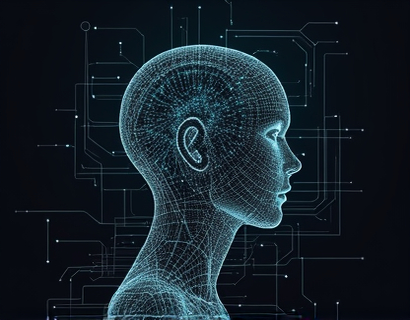Unlocking Creative Potential and Emotional Well-Being in Children with AI-Powered Imaginative Companions
The integration of artificial intelligence in children's lives has opened new avenues for enhancing their creative potential and emotional well-being. Advanced AI-powered imaginary companions are revolutionizing the way children play, learn, and interact, offering personalized experiences that foster imaginative play and social skills in a secure digital environment. This article delves into the transformative impact of these AI companions on children's development, exploring how they can be harnessed to ignite creativity and promote emotional health.
Understanding the Role of AI in Children's Creativity
Creativity is a fundamental aspect of child development, essential for problem-solving, critical thinking, and emotional expression. Traditional toys and activities have long been the go-to methods for stimulating a child's imagination. However, the advent of AI technology has introduced a new dimension to this process. AI-powered imaginary companions are designed to understand and respond to a child's unique interests and emotional states, providing a tailored experience that encourages creative exploration.
These companions use natural language processing and machine learning algorithms to engage in meaningful conversations, tell stories, and even create art based on the child's input. By adapting to the child's preferences and evolving over time, AI companions offer a dynamic and interactive platform that keeps the child engaged and inspired. This personalized approach not only enhances the child's creative output but also boosts their confidence in expressing themselves.
Promoting Emotional Well-Being Through AI Companions
Emotional well-being is as crucial as cognitive development in a child's overall growth. AI-powered imaginary companions play a significant role in supporting emotional health by providing a safe and non-judgmental space for children to express their feelings. These companions can recognize and respond to a child's emotional cues, offering comfort and guidance when needed. This emotional support helps children develop resilience and coping strategies, essential skills for navigating the complexities of growing up.
Moreover, the relationship between a child and an AI companion can be particularly beneficial for those who may struggle with social interactions or feel isolated. The companions serve as a bridge, helping children practice social skills in a low-stress environment. Through role-playing and interactive scenarios, children can learn to communicate effectively, empathize with others, and build meaningful relationships.
Personalized Interactions for Enhanced Engagement
One of the key strengths of AI-powered imaginary companions is their ability to offer personalized interactions. Each companion is programmed to learn from the child's behavior and preferences, adapting its responses and activities to suit the individual. This customization ensures that the child remains engaged and motivated, as the companion evolves alongside their interests and abilities.
For instance, a child interested in dinosaurs might find their companion transforming into a paleontologist, leading them on virtual digs and teaching them about different species. This level of personalization not only makes the experience more enjoyable but also reinforces the child's passions and curiosities, further stimulating their creative mind.
Fostering Imaginative Play
Imaginative play is a critical component of childhood development, allowing children to explore their creativity, test boundaries, and develop cognitive skills. AI-powered companions enhance this play by providing endless possibilities and scenarios. Whether it's creating a magical kingdom, solving puzzles, or embarking on space adventures, the companion adapts to the child's narrative, ensuring the play remains fresh and exciting.
These interactions encourage children to think outside the box, combining different elements and concepts to create unique stories and situations. The AI's ability to follow and expand on the child's ideas fosters a collaborative creative process, where the child feels empowered and in control. This sense of agency is vital for building self-esteem and fostering a lifelong love for creative activities.
Supporting Social Skills Development
Social skills are essential for a child's success in both personal and professional life. AI-powered imaginary companions offer a unique platform for children to practice and refine these skills in a controlled and supportive environment. Through interactive scenarios and role-playing, children can learn to communicate effectively, understand different perspectives, and develop empathy.
For example, a companion might present a situation where the child needs to resolve a conflict between two characters. The child can choose different responses, seeing the outcomes of their decisions. This trial-and-error approach helps them understand the consequences of their actions and develop better social judgment. Additionally, the companion can provide positive reinforcement and guidance, reinforcing positive social behaviors.
Creating a Safe Digital Environment
Safety is a paramount concern for parents and guardians when it comes to children's digital interactions. AI-powered imaginary companions are designed with robust safety features to ensure a secure and positive experience. These companions operate within a controlled digital environment, free from inappropriate content and harmful interactions. Parents can set boundaries and monitor the child's activities, providing peace of mind while allowing their children to explore and learn.
Moreover, the AI algorithms are programmed to maintain privacy and data security, adhering to strict standards to protect children's information. This commitment to safety makes AI companions a reliable tool for parents seeking to integrate technology into their child's life without compromising their well-being.
Encouraging Healthy Screen Time Habits
While digital interactions offer numerous benefits, it is essential to promote healthy screen time habits. AI-powered imaginary companions can help strike a balance by encouraging children to engage in a mix of digital and offline activities. The companions can suggest breaks, recommend physical games, or even inspire creative projects that don't involve screens. This holistic approach ensures that children benefit from technology without becoming overly reliant on it.
Parents can also use these companions as a tool to set and enforce screen time limits, integrating them into a broader strategy for managing digital usage. By framing AI interactions as part of a balanced routine, parents can help their children develop healthy habits that extend beyond the digital world.
Conclusion
The integration of AI-powered imaginary companions into children's lives represents a significant step forward in enhancing their creative potential and emotional well-being. These advanced companions offer personalized, interactive experiences that foster imaginative play, support social skills development, and provide a safe digital environment. By leveraging the power of AI, parents and guardians can support their children's growth in a way that is both engaging and beneficial.
As technology continues to evolve, the potential for AI to positively impact children's development is vast. By embracing these innovative tools, we can create a future where children are not only creative and imaginative but also emotionally resilient and socially adept. The journey begins with exploring the possibilities that AI-powered imaginary companions have to offer.











































